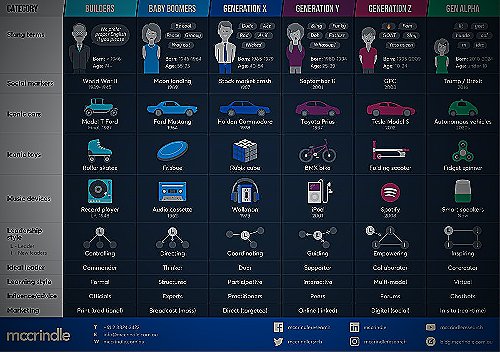What Comes After Gen Z: Future of Employment
As Generation Z begins to enter the workforce, many are wondering what comes after Gen Z and how this will impact the future of employment. The answer lies in Generation Alpha, the generation born in or after 2010 and currently under the age of 13.
While still young, their upbringing in a technology-driven world will undeniably shape their future and the workforce they will one day inherit.
Who are Generation Alpha?
Generation Alpha is the generation that follows Generation Z and includes all children born in or after 2010. They are currently the youngest generation, with the majority of them being under 13 years of age.
The oldest of them will become teenagers in 2023.
Generation Alpha has been called the “tech-savviest generation” because they were born in an era where technology is ubiquitous. They are growing up in a world where smartphones, tablets, and other devices are a normal part of everyday life.
Therefore, they are more comfortable with technology than any generation before them.
Unlike previous generations, Generation Alpha has never known a world without social media. They are growing up with platforms like YouTube, Instagram, and TikTok being an integral part of their lives.
They are also growing up in a world that is more diverse and inclusive than ever before, with more representation for different races, genders, and sexual orientations in media and society as a whole.
The expectations of Generation Alpha are still being formed, but it is likely that they will value education, innovation, and diversity. They are also likely to be more socially and environmentally conscious, having grown up in a world where climate change is an ever-present issue.
As they grow older and become more active in society, we are sure to see how they will shape the world around them.
The Great Screen-Age
The rise of digital natives
Generation Alpha, being the first generation born entirely into the digital era, are often referred to as digital natives. From the moment they are born, technology is already a part of their lives.
They are comfortable and competent with digital devices such as smartphones, tablets, and laptops. It is important to understand this demographic’s digital literacy, preferences, and expectations when designing recruitment strategies and talent management programs.
Screen time and attention span
The increasing use of technology has sparked concerns about the impact of screen time on children’s cognitive development. Studies show that too much screen time can lead to shorter attention spans.
Generation Alpha’s dependence on electronic devices could lead to decreased productivity, difficulty with time management and delayed skill development.

As Generation Alpha grows up, traditional education may no longer be enough to prepare them for a rapidly changing workforce. With the rise of automation and AI, jobs that are currently available may no longer exist by the time this generation enters the workforce. As a result, we can expect a shift towards more adaptive and dynamic forms of education that can keep up with technological advancements.
While technological knowledge and hard skills will undoubtedly be important for this generation’s future employment, soft skills like interpersonal abilities, emotional intelligence, and adaptability will be equally crucial. As the workforce becomes increasingly global and interconnected, the ability to communicate, collaborate, and work well with others will become vital for success. Additionally, the need for adaptability will be high as career paths become less linear and more unpredictable. In order to succeed, members of Generation Alpha must be able to learn quickly, adapt to new situations, and change course when necessary.
What Comes After Gen Z?
The world is constantly changing, and so are the generations that occupy it. The next generation after Gen Z is currently being referred to as Generation Alpha.
This demographic cohort includes all children born from 2010 to 2024.
The influence of technology and AI
One defining characteristic of Gen Alpha is their widespread exposure to technology. As the world becomes increasingly more reliant on technology and artificial intelligence (AI), it is expected that this cohort will have an even deeper understanding and familiarity with these tools.
As Gen Alpha enters the workforce, they will be the first to have a truly native understanding of technology. They will be able to navigate technological advancements with ease and will likely be well-suited for roles that require a deep understanding of AI and other technologies.

The impact of socio-economic trends
Economic and demographic shifts will shape the job market and expectations of Gen Alpha. As they enter the workforce, they will face a rapidly changing job market that is increasingly competitive and reliant on technology.
With higher levels of education, Gen Alpha is expected to be the most educated generation to date. They will likely be highly skilled and trained, making them highly desirable employees in the workforce.
As they enter the workforce, Gen Alpha may seek out jobs that allow for more flexibility, such as remote work options. They may also demand higher salaries and better benefits, as their education and skills will be highly sought after.
Conclusion
While there is still much speculation about what will come after Generation Alpha, it is important to stay informed and prepared for the potential changes and impact on the workforce and economy.

